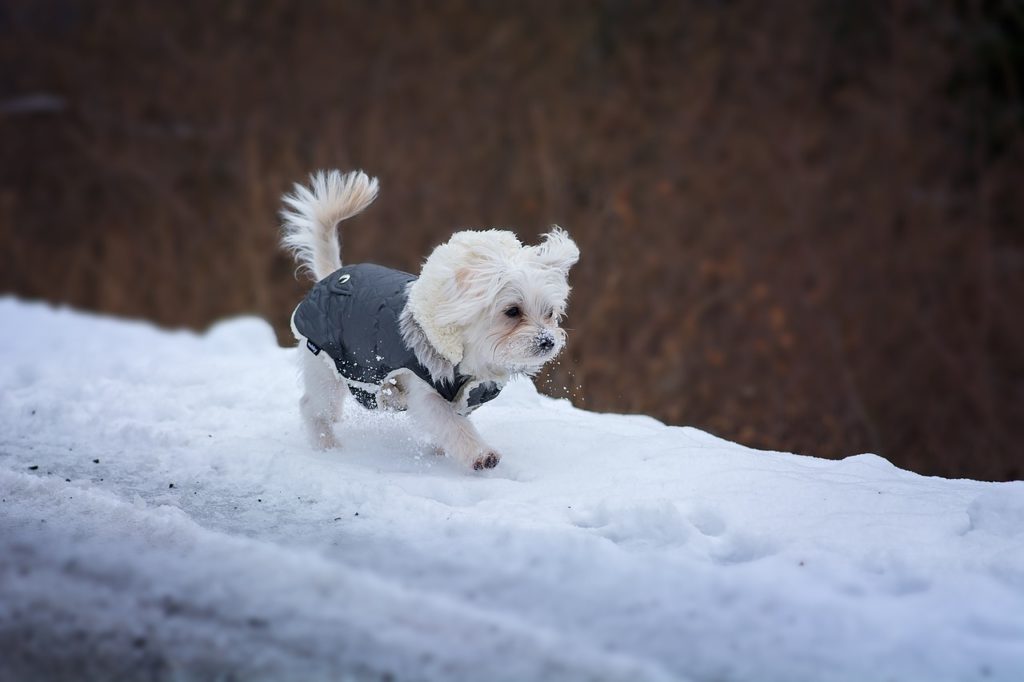
With winter peering its frosty head around the corner, there are many things you need to do to make sure your pets are safe. Whilst this time of year can be great for your little balls of fur, the cold weather can be dangerous, if you don’t leave behind a few habits from the summer months.
Don’t leave your pets out in the cold
Most pets adore exploring the great outdoors. When the temperature drops, it can be dangerous for them to stay outside for long periods of time. Keeping them warm is essential. If you must keep your pet outside, then provide a warm, dry and draft-free shelter for them to stay in.
Wipe your feet on the way in, please
Another danger of ice, sleet and snow is the way it can become impacted in paws. This can make them painful and even bleed. If you have a smaller dog, their stomachs and legs will usually be wet, so wiping them down can prevent dangerous residues, like antifreeze, from being ingested. The salt used to melt ice on pathways and roads can also irritate paws, so it’s important to wipe your whole pet when you return home.
Pet fashion
Some animals have a thick coat of fur, but dogs like Chihuahuas, or Greyhounds and cats like Sphynxes, are vulnerable to nippy weather. Even short walks can be uncomfortable for them. It’s a great idea to invest in an animal-sized sweatshirt, or coat, to keep them warm outside. A good tip is to feel the ends of your pet’s ears. If they are colder than usual you need to bring your pet inside.
Keep one eye open at all times
Usually cold weather is accompanied by ice, sleet and snow, which can impact upon your pet’s sense of smell. If you’re taking them out for a walk and they get lost, they will struggle to find their way back to you. Make sure your pet always wears an ID tag and has a microchip registered to a national database, so they can easily be returned.
Please sir, may I have some more
Staying warm when it’s cold requires a lot more energy than you think. Your furry friends will have to eat more, to have the energy to stay warm. It is important to keep an eye on their water bowls, to make sure they haven’t frozen over.
Indoor pets have different dietary needs. They store energy by sleeping more in the winter. Dogs and cats also exercise much less in the winter, so you need to adjust the amount of food you give them accordingly.
Car safety
Just like in summer, cars can be dangerous places for animals in winter. Your car can become a freezer on wheels, holding in the cold and becoming lethal to any animal that stays inside for long periods of time. Only take car journeys when necessary and don’t leave your pet unattended.
Pick your poison
Antifreeze might taste great to animals, but it comes with fatal consequences. Ingesting even the smallest amounts can be enough to kill. If your pet starts to act ‘drunk’, or begins to convulse, then take them to a vet immediately. Keep animals away from your garage and clean up any accidental spillages. When on walks with your dog, make sure they don’t wander too far alone and across other people’s drives.
What’s under the hood?
Before you jump into your car, bang the hood to scare away any unwanted animals under the bonnet. In the winter, cars are the warmest thing outside, so cats and little animals often get under the hood and fall asleep on the warm engine. Check that you aren’t taking any surprise passengers for a ride before you set off.
Happy holidays!
Ornaments, tinsel and other Christmas decorations can be intriguing toys for your pets. Make sure decorations are well out of the reach of your furry little critters, so they don’t chew or swallow anything that could be harmful to them. Certain plants, that are only seen in the winter, can harm your pet’s stomach. Sharp pine needles from the Christmas tree can be highly dangerous if ingested. Mistletoe, berries and lilies can also be harmful, even poisonous to cats and dogs.
Winter grooming
Keep your pet’s hair longer than usual in winter, to make sure they stay warm. Their nails will need more frequent trimming, as they will be inside for longer. If you give the full spa treatment at home, make sure that your pets are fully dry when they get out of the bath, because dampness will only enhance the cold. It’s also important to examine your pet’s feet for irritations, or cracks and to apply a pet-friendly balm if necessary.
If you’re cold, then your fuzzy friend will most likely be cold too. So, snuggle up, put the kettle on and sleep this winter away. If you follow all these steps, you’ll have a happy and healthy pet, ready to enjoy the summer. Find out more about caring for your animals with our Veterinary Support Assistant course.








Leave a Reply